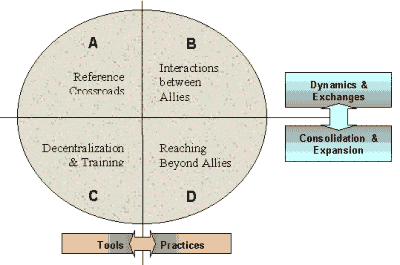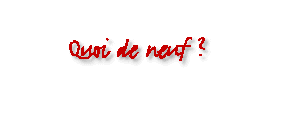| |
| Communication
team: Ricardo
Gomez, Marina Urquidi, Daniel
Pimienta, Franck Fourmental, Gustavo
Marin, Philippe Amouroux, Francoise
Holtz Bonneau
|
A small group
of allies has been actively debating how to
strengthen all these communication activities and
tools for the purposes of the Alliance. As a
result of this process, we have come up with the
following ideas, which we put forward to all
Allies, hoping to elicit your comments,
suggestions, enthusiasm and participation. We
invite you to comment and complement these ideas,
and to help us find ways in which we can
effectively communicate both among Allies and
with others about our joint activities and
collective dreams.
This text is
the result of a collective process that began
during the Assembly 97 in Brazil, and which has
continued in remote discussions and group
meetings during 1998. We draw from various
documents and ideas related to communication
needs and practices which have circulated in the
past year. More than defining a charter of rights
and duties for allies, we seek to understand the
communication challenges facing the Alliance for
1999-2001.
Communication in
the Alliance
The success of the
Alliance depends not only on the enthusiasm and
commitment of its allies undertaking relevant
activities together, but on the existence of
communication ties that ensure a strong, fluid
and well structured flow of information. In order
better understand the challenges of strengthening
communication tools and practices in the
Alliance, we suggest a map with four different
kinds of approaches and activities. They are all
inter-related, and we separate them only for
conceptual clarity. As any conceptual framework
it is imperfect and incomplete, but it helps us
understand the challenges ahead.
Figure
1: Schematic representation of Communication in
the Alliance

- Reference
Crossroads: these are the concrete
instruments allies use for information
and communication, through a variety of
media. These tools and instruments
constitute the crossroads of information
and communication exchange between
allies. They include publications,
electronic forums & their archives,
web site, machine translation, fax
relays, databases, and other forms of
information to allies. Technological
convergence makes it increasingly
possible for some to access and use most
of these activities electronically, and
they can all me managed and maintained
with Internet tools; but we need to
provide different supports (paper, print)
to meet all needs and possibilities.
- Interactions
between Allies: These are the
relationships and interactions by which
allies share, exchange and use each
other’s experiences and knowledge
for collective action. Most notably,
these relationships take place through
meetings and remote discussions. These
interactions between allies frequently
use the tools described as Reference
Crossroads, and their results are
generally reflected in one or more of
these tools (from a note in a database or
a forum to a final publication).
- Decentralization
and training: Expanding and
strengthening the Alliance means
decentralizing activities and tools (to
regional poles or working teams in
different regions), providing human and
technical support to facilitate
participation in the Alliance,
introducing new allies to the collective
memory of the network, etc.
- Reaching
beyond Allies: we are aware at this
point there is no clear inside/outside
distinction in the alliance, so the
notion of ‘external
communication’ we have been using
since Bertioga may not be appropriate for
now. But we need to address communication
practices that will help us go beyond
‘preaching to the converted’.
Here we refer to communication activities
and human interactions intended to reach
out to potential new allies and partners,
to influence decision- and policy-makers,
and to reach the public opinion at large
(possibly seeking to use mass media
directly or indirectly).
These four axes
synthesize what we see are the main challenges in
the communication needs of the Alliance in the
years to come. They represent a set of tools (the
left hand side, including the Reference
Crossroads and Decentralization and Training) and
a set of relationships or practices (the right
hand side, including Interactions Between Allies
and Reaching Beyond Allies). Schematically
(although the match is incomplete and imperfect),
the tools should help us strengthen the
relationships. On the other hand, the four axes
also represent a focus on strengthening
collective dynamics and exchanges (the upper
portion) as well as on consolidating and
expanding the reach and scope of the Alliance
(the lower portion).
Communication
Processes
In our view, based
on the above understanding, the Alliance needs to
strengthen three different communication
processes: building its collective memory,
documenting its achievements and progress in a
data bank, and stimulating collective discussion
and action. Each of these processes would help to
strengthen communication in the alliance in
different and inter-related ways, even if
emphasizing one aspect over others. In other
words, these processes would help to strengthen
in different ways the Reference Crossroads and
the Interactions Between Allies, as well as the
Decentralization and Training and the Reach
beyond Allies. The order in which they are
presented is irrelevant.
- Collective
discussion and action: The Alliance is
brought alive by its allies working
together to reflect and act about the
future of the planet. Debates and
exchanges of experiences, both face
to face and remote, are organized around
a shared agenda that maximizes
their reach and scope.
- Documenting
progress and achievements: Consolidating
the collection and circulation of information
resources produced by and for allies
in the form of books, reports and other
documents. These form a decentralized web
of resources that can be linked together
by an open-architecture database,
maintained by decentralized poles and
openly accessible (possibly with
different layers of access to create,
modify or read different sections
depending on the user).
- Building the
collective memory of the alliance: This
includes revising, updating and
disseminating the founding texts
of the Alliance and other important
landmarks in its process of development.
Also, collective memory is sustained with
active access to a dynamic, decentralized
and updated database of allies.
Strengthening
Communication Tools
In order to
strengthen these communication processes, the
Alliance has been using different tools,
instruments or activities. Some of them need
extra attention and dedication make them more
relevant and effective for communication in the
alliance. After closer analysis, and taking into
consideration present and future needs, we
identified which tools and activities are on a
higher immediate priority for the Alliance’s
advance:
- Databases:
the most urgently needed communication
tool in the Alliance is an integrated set
of databases with open architecture and
decentralized maintenance. Upgrading the directory
of allies, and perfecting a database
of experiences (to include ongoing
experimentation with fiches de suivi,
publications, reports and other
documents, shared agenda, archives of
electronic forums and, ideally, a gateway
to DPH). This integrated database should
be available and accessible online (with
possibility of password-protected areas,
machine translation, and decentralized
maintenance and data entry), include an
open text search engine, and could
feature a way to include traditional
keywords and labels for structured
searches.
This item will be handled by Gustavo
& Philippe, who will prepare terms of
reference and seek technical expertise
for the design and implementation of
these tools. It is understood there are
many powerful open-architecture, web
capable database software packages
commercially available, and we will not
need to create a new one from scratch.
Although managed and accessible on the
Internet, we need to ensure contents will
also be available to non-networked
allies.
- Forums:
ranking second in need for immediate
attention, discussion forums need to be archived
and moderated. Archives constitute
an online, automatic, organized and
searchable database that needs to be
linked to the other databases (above) and
to their search engines. Experience shows
that a listserv is not enough to maintain
virtual communities active and engaged,
and that the role of a moderator is
increasingly important. Forums are an
important tool for the Alliance, but they
will require active moderation in
addition to further work in machine
translation if we are to take advantage
of more of their potential.
The COM forum will put into practice an
experimental methodology for moderated
remote discussion, collective work and
automatic translation as part of the
MISTICA project carried out by FUNREDES
in Latin America. This methodology, once
refined, can be expanded to include other
remote discussions and forums.Daniel and
Marina will prepare a proposal for the
active management and moderation of the
forums, including the possibility of
their transfer to Funredes server. The
proposal will include a relay mechanism
to reach non-networked allies.
- Web Site:
The web site of the Alliance (http://www.echo.org) is growing and
now features a "What’s
new" section that keeps up-to-date
information about activities in the
alliance. The creation of a "web
editorial team" is suggested. Franck
has been playing the role of
‘webmaster’, although more time
would be needed to perform that role
better, especially as more allies,
chantiers and working groups gain
internet access and want to set up their
own on-line information sites. The
Alliance cannot provide web hosting or
design to all chantiers; each will be
expected to solve it locally, building
links to and from the general site, and
possibly be included in the search
engine. A clearer map of the site to
navigate through the growing number of
links will be needed. Also, the web site
should include electronic versions of all
Alliance publications, including Caravan.
Management and maintenance of the web
site can eventually be decentralized. A
web-to-email relay should be installed
for allies with only e-mail connectivity.
FPH is currently discussing with
BikeAbout, an organization in USA, for
the strengthening and maintenance of the
web site.
- Print
Publications: Allies are publishing a
growing number and variety of documents,
meeting declarations, adaptations of the
Platform etc., in addition to Caravan and
other regional newsletters. This
diversity will continue to be encouraged.
Electronic versions of these publications
should be linked on the web site.
- Meetings:
Thematic, regional or collegial meetings
will continue to be organized at the
discretion of allies. The organization of
the 2001 Assembly will slowly move to the
top of the priority list.
In due time, the communication team will
seek the best ways to support the
International Orientation Team for the
Alliance which will be conformed soon, in
particular for the activities related to
the preparation of the Assembly 2001.
The working
group in communication will continue to act as a
resource for the Alliance, coordinated by Ricardo
Gomez. Its main tool is the COM forum, which is
open to all allies to subscribe and participate.
Communication in
the Alliance is an ongoing process. All Allies
are part of this process, and we all contribute
to it from our own areas of reflection,
intervention and action. We cannot force any
communication system or procedure upon allies,
but we can facilitate processes and remain open
and sensitive to emerging and changing needs,
resources and possibilities in order to
contribute to the strengthening of the Alliance.
Ricardo Gomez
(ricardo.gomez@writeme.com)
IDRC PO Box 8500
Ottawa, Ontario K1G 3H9 Canada
fax +1(613) 567
7748
|
|

